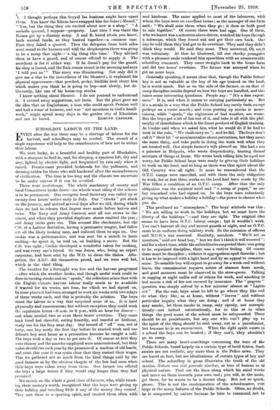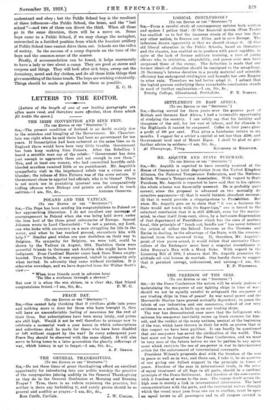SCHOOLBOY LABOUR ON THE LAND.
EVEN after the war there may be a shortage of labour for the
harvest, and schoolboys may be needed. The record of a single experience will help to the consideration of how not to utilize their labour.
We were lucky, in a beautiful and healthy part of Blankshire, with a marquee to feed in, and, for sleeping, a spacious loft, dry and airy, lighted by electric light, and frequented by rate only when it rained. Potato-cases provided bedsteads for the palliasses, and dressing-tables for those who still hankered after the encumbrances of civilization. The time is too long and the climate too uncertain to be under canvas if it can be avoided.
There were contretemps. The whole machinery of county and local Committees broke down—its wheels want oiling if the scheme is to be permanent. Our energetic local Secretary was called up at twenty-four hours' notice early in July. Our " crooks " got stuck on the journey, and arrived several days after we did, during which (lays we had to relearn that fingers were made before knives and forks. The Navy and Army Canteen sent all our stores to the school, and when they provided duplicate stores omitted the jam ; and Army cooks gave out. This seemed like checkmate, but the C.O. of a Labour Battalion, having a persuasive tongue, had fallen out all the likely looking men, and induced them to sign on. Our cookie was a patteramaker, and was sent for a month to learn cooking—he spent it, he told us, on building a stove. But the C.O. was right ; Cookie developed a wonderful talent for cooking, and was every one's friend. So was Jones, who, being an expert carpenter, had been sent by the W.O. to clean the dishes. Alto- gether, the A.S.C. did themselves proud, and we were well fed, which is the chief thing.
The weather for a fortnight was fine and the harvest progressed —after which the weather broke, and though useful work could be done in turning stooks and on" spuds," the reflection arises that with the English climate harvest labour really needs to be available if wanted for aix weeks, not four, for which we bad signed on In some places it had been arranged to work six weeks with two relays of three weeks each, and this is probably the solution. The boys stood the labour in a way that surprised some of us. It is hard physically and monotonous; but without exception they could work the regulation hours-9 a.m. to 6 p.m., with an hour for dinner— and when needed two or even three hours' overtime. They came back tired but cheerful, eating heartily, and tuneful at bedtime, ready too for the fray next day. Our record of " oft " wee, out of forty, one boy seedy the first day before he started work and one delicate boy sent home as a precaution because he caught a (sold. The boys took a day or two to get into it. Of course at first they Nvere clumsy and the muscles employed were unaccustomed, but their value should rise each year by the presence of a nucleus of old hands, and even this year it was quite clear that they earned their wages. This we gathered not so much from the kind things said by the good farmers as by the obvious chagrin of the few bad ones when their boys were taken away from them. One farmer too offered the boys a large bonus if they would stay longer than they had promised.
We struck on the whole a good class of farmers, who, while exact- ing their money's-worth, recognized that the boys were giving up their holiday and touching little if any of the money they earned, They met them in a sporting spirit, and treated them often with reel kindness. The same applied -to most of the labourers, with • whom the boys were on excellent terms ; as the manager of one farm said : "We shall miss them when they go ; it does us both geed to mix together." Of course there were bad eggs. One of them, who we learnt was a notorious slave-driver, watched his boys through a telescope, which they found out and got their own back. One day he told them they had got to do overtime. They said they didn't think they would. He said they must. They answered, Oh no, it was voluntary. At that he blustered, till one cheeky yourigster with a pleasant smile rendered him speechless with an unanswerable schoolboy comment. They came straight back to the home farm and did two hours' overtime. The farmer was annoyed when he got AO more boys.
Generally speaking, it seems clear that, though the Public School boy is not as valuable as the boy of his age trained on the land, he is worth much. But as on the side of the farmer, so on that of camp discipline results depend on how the boys are handled, and this raises some interesting questions. People say : "It's a fine experi. ence." It is, and when it comes to carrying particularly so. But it's a strain in a way that the Public School boy rarely feels, except perhaps on a route march ; and even putting up stooks is mono- tonous, while "spuds," the nightmare of bad weather, are worse. But the boys get a lot of fun out of it, and take it all with the phil- osophy of oheerfulness which is the finest product of English training. As Cookie said when we asked him what he would do if he had to cook in the rain, "We shall carry on "; and he did. Theboys don't call it" their bit" or sentimentalize about patriotism, but they mean the same thing, and take pride in doing the work well when they are treated well. One simple farmer's wife pleased us. She had a son a prisoner in Bulgaria, who wrote despondently, hearing dismal accounts of things at home. She wrote back telling him he need not worry, for Public School boys were ready to give up their holidays to work on the land, and so long as there was that spirit about the Old Country was all right. It must be remembered that the O.T.C. camps were cancelled, and with them the only obligation to work, for at first three weeks on the land had been made by the War Office a condition of an O.T.C. camp. After that the only obligation was the national need and "a scrap of paper," as one boy remarked who had signed on. So the boys ware voluntarily giving up what makes a holiday a holiday—the power to choose what you do.
This produced an "atmosphere." The boys' attitude was this "We are willing to work in the holidays, but we must have the liberty of the holidays "—and they are right. The original idea seems to have been O.T.C. labour camps ; but it wouldn't work. You can't harvest all day and mount guards at night, and an O.T.C. must be in uniform doing military work. So the intrusion of officers and N.C.O.'s WES resented. Similarly, monitors. "We'll ext as monitors," said our head boy, " but we don't think it will succeed"; and for a short time, while the subordinates suspected there was going to be organized discipline, there was a restive feeling. Of course there must be discipline ; without it aggregations spell disorder ; but it has to be imposed with a light hand and by an appeal to common- sense. No sensible boy will expect to go away for a week-end without leave, the commissariat requires notice of absence from mesh% and good manners must be observed in the stew-queue. Talking or ragging at night unfits self or others for work, and smoking in bed means a risk of fire not covered by insurance. The " prayers " question was simply solved by a few minutes' silence at "Lights out" For the rest, boys must be left to go where they like and do what they like, as at home, without ." leaves" and without
particular inquiry what they are doing ; and if at home they may smoke, let them smoke in camp, only openly, net surrepti- tiously—.not indeed ostentatiously, for in this as in other
things the good name of the school must be safeguarded. There should be no punishment, but any one who can't play up to
the spirit of the thing should be sent away, not as a punishment, but because he is an excrescence. When the right spirit exists in a school the boys can be trusted; if they can't, they shouldn't go to camp.
There are many heart-searchings concerning the tone of the Public Sehools, based largely on a certain type of lurid fiction. Such stories are not realistic, any more than is the Police news. They are based on fact, but are idealizations of certain types of boy and school. The schoolboy in gross illustrates the truth of the old maxim, Return non nisi parendo vincitur, as true of human as of physical nature. Find out the lines along which his mind works and move on them towards your own end ; you will, in the main, get there, for he wants to be a decent chap. But not so quick,
please. This is not the condemnation of the schoolmaster, writ large in the many failures of the Public Schools. Often, no doubt, be is conquered by nature because he tries to command, not to
understand and obey ; but the Public School boy is the resultant of three influences—the Public School, the home, and the "last school "—and two of these can divert the third. When all these go in the same direction, there will be a move on. Some boys come to a Public School, if we may change the metaphor, entrenched in a fortified position from which the heaviest artillery of Public School tone cannot drive them out. Schools are the reflex of society. So the success of a ()amp depends on the tone of the boys and the common-sense of the master.
Finally, if accommodation can be found, it helps enormously to have a lady or two about a. camp. They are good at stores and coupons and things. They will look after sick boys, sweep out the dormitory, mend and dry clothes, and do all those little things that give something of the home touoh. The boys are working voluntarily. Things should be made as pleasant for them as possible.
E. 0.0.



































 Previous page
Previous page